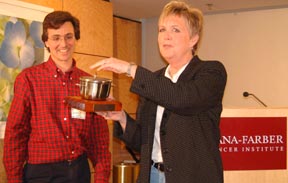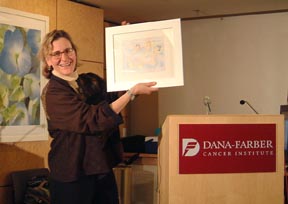Dishing out hope
Dishing out hope: Survivor's mom helps feed families facing neuroblastoma.
Every Sunday for the past eight years, Mary Russell of Brookline has assembled platters of pasta, roasted chicken, hearty soup, and fixings, then taken them to youngsters facing cancer at Children's Hospital Boston.
Delivering these dishes gives Russell a chance to cheer up the patients and families on 6 and 7 West, as well as to thank the caregivers there for successfully treating her daughter, Catherine Lyons, for neuroblastoma – an aggressive cancer of the nervous tissue.
On March 23,2003 it was Russell's turn to receive thanks for her generosity. That's when "Friends for Life", a group dedicated to raising funds for research into neuroblastoma and other pediatric cancers at Dana-Farber (where Catherine was also treated), handed her a Soup Pot award a small stainless steel cauldron bearing a thank you plaque.

Mary Russell (right) receives the "soup pot" Award from Dodd.
There to applaud Russell were about 50 "Friends" members who had gathered in the Smith Family Room to discuss their organization’s progress and learn about advances in clinical care and research from DFCI physicians Lisa Diller, MD, and Thomas Look, MD, both of Pediatric Oncology.

Lisa Diller, MD accepts a print of the "Friends for Life" logo created by Michael Dodd.
The illness, which occurs mainly in children under age 5, is the third most common type of cancer in children. Although seven of every 10 children diagnosed with neuroblastoma now achieve remission – thanks in part to children like Catherine Lyons who helped test new therapies – there is no treatment for all children with neuroblastoma or for those who may relapse.
Catherine, now 12, was one of the first youngsters to undergo the now-standard regimen developed by Diller, which involves several rounds of chemotherapy, surgery to remove the tumor, radiation therapy, and one or two stem cell transplants followed by biologic treatment with accutane for six months, according to Dodd.
During Catherine’s hospitalization at Children’s, a friend arranged to have meals delivered each week, and “they never failed us,” Russell recalls. So she decided to return the gesture.
Each week, she scans her fridge and figures out what to prepare, drops it off in the family kitchen serving 6-7 West, “and then whisks out as anonymously as possible,” she says. On Thanksgiving, she brings a turkey-dinner spread leftover from her church, and on those rare weeks she’s away, Russell and her husband order pizza for delivery to the units.
Just as valuable as the food, however, is the empathy that Russell shares regularly with families going through treatment for neuroblastoma. Both she and Catherine recount their story, answer questions, and inspire others by simply being a thriving survivor and her mom.
For more information about "Friends for Life", contact Denyse Dodd
(617) 872-6020 denysed@myfriendsforlife.com.
Published in Dana-Farber "Inside the Institute" March 30th , 2003
http://myfriendsforlife.com/temp/ITI4-30-2003.pdf
Every Sunday for the past eight years, Mary Russell of Brookline has assembled platters of pasta, roasted chicken, hearty soup, and fixings, then taken them to youngsters facing cancer at Children's Hospital Boston.
Delivering these dishes gives Russell a chance to cheer up the patients and families on 6 and 7 West, as well as to thank the caregivers there for successfully treating her daughter, Catherine Lyons, for neuroblastoma – an aggressive cancer of the nervous tissue.
On March 23,2003 it was Russell's turn to receive thanks for her generosity. That's when "Friends for Life", a group dedicated to raising funds for research into neuroblastoma and other pediatric cancers at Dana-Farber (where Catherine was also treated), handed her a Soup Pot award a small stainless steel cauldron bearing a thank you plaque.

Mary Russell (right) receives the "soup pot" Award from Dodd.
"I was surprised and touched," says Russell. "This is just my little way of helping people whose shoes I’ve been in."
There to applaud Russell were about 50 "Friends" members who had gathered in the Smith Family Room to discuss their organization’s progress and learn about advances in clinical care and research from DFCI physicians Lisa Diller, MD, and Thomas Look, MD, both of Pediatric Oncology.

Lisa Diller, MD accepts a print of the "Friends for Life" logo created by Michael Dodd.
"We also announced the establishment of an endowed fellowship to support a translational (bench-to-bedside) research position," explains Denyse Dodd of Needham, who co-founded Friends for Life with her husband, Michael, after their daughter, Isabelle, was treated for neuroblastoma here. "The organization has already raised $110,000 toward its five-year, $1 million goal."
The illness, which occurs mainly in children under age 5, is the third most common type of cancer in children. Although seven of every 10 children diagnosed with neuroblastoma now achieve remission – thanks in part to children like Catherine Lyons who helped test new therapies – there is no treatment for all children with neuroblastoma or for those who may relapse.
“We are working to change these terrible facts,” says Denyse Dodd.
Catherine, now 12, was one of the first youngsters to undergo the now-standard regimen developed by Diller, which involves several rounds of chemotherapy, surgery to remove the tumor, radiation therapy, and one or two stem cell transplants followed by biologic treatment with accutane for six months, according to Dodd.
During Catherine’s hospitalization at Children’s, a friend arranged to have meals delivered each week, and “they never failed us,” Russell recalls. So she decided to return the gesture.
Each week, she scans her fridge and figures out what to prepare, drops it off in the family kitchen serving 6-7 West, “and then whisks out as anonymously as possible,” she says. On Thanksgiving, she brings a turkey-dinner spread leftover from her church, and on those rare weeks she’s away, Russell and her husband order pizza for delivery to the units.
Just as valuable as the food, however, is the empathy that Russell shares regularly with families going through treatment for neuroblastoma. Both she and Catherine recount their story, answer questions, and inspire others by simply being a thriving survivor and her mom.
"This is the kind of things you need to hear when you’re facing neuroblastoma," Dodd explains. “Mary delivers not only food but hope.”
For more information about "Friends for Life", contact Denyse Dodd
(617) 872-6020 denysed@myfriendsforlife.com.
Published in Dana-Farber "Inside the Institute" March 30th , 2003
http://myfriendsforlife.com/temp/ITI4-30-2003.pdf

0 Comments:
Post a Comment
<< Home